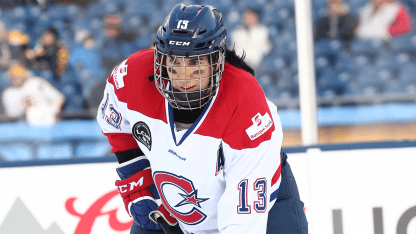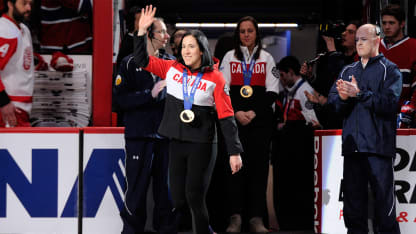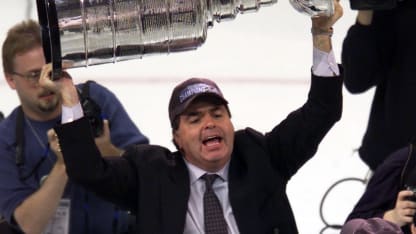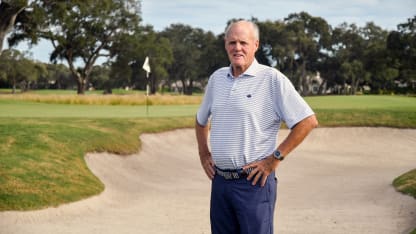Daniele Sauvageau first coached Caroline Ouellette with Hockey Canada in 1996, when the under-19 women's team was founded, beginning a lengthy and successful relationship with the forward that included winning the gold medal at the 2002 Salt Lake Olympics. Ouellette went on to win Olympic gold with Canada three more times (2006, 2010, 2014) to go with six gold medals at the IIHF World Championships (1999, 2000, 2001, 2004, 2007, 2012) before retiring in 2018.
Here Sauvageau, now general manager of Montreal in the Professional Women's Hockey League, shares her thoughts on Ouellette, who will be inducted into the Hockey Hall of Fame on Monday, in a special testimonial for NHL.com:
I was privileged to coach Caroline Ouellette, first on what we used to call the women's under-19 team in 1996. It was the first time that Canada had that kind of a development team for women's hockey, and at the time, we didn't have long lists of players to choose from.
I remember we had a group of maybe three, four or five players and then we picked Caroline. Even today, I wonder what would have happened to the players that we didn't choose that year. But, obviously, one thing for sure is that Caroline was a great pick.
I'm a strong believer that you choose a player, but the rest is on them. It's on their shoulders. It's on them individually to grow and to continue. The only thing that a coach can do is to create the environment for people to come in and excel.
Caroline, obviously, took that opportunity and she took it to the Hockey Hall of Fame.
Actually, I knew Caroline before the under-19 team because she's from Quebec and I'm from Quebec. I feel I could write a book about Caroline because I've known her for more than 30 years.
She must have been 13 or 14 years old when I first saw her play and I saw her suddenly going from 4-feet to 5-7 in a year and a half or so. She went from coming into a dressing room as such a shy kid and being almost like a gentle giant, so to speak, compared to the other kids. She wanted to do her best and didn't want to speak too much as compared to the person we know today.
Caroline was very competitive. Often, we talked about discipline. You can have the discipline, you can be very disciplined, but when things are not going well, you stop competing.
But Caroline never stopped competing. So, perseverance, I think, is one of the things that makes her special.
Caroline was first exposed to what it takes to be an athlete when she played for Canada at the 1999 IIHF World Championship. We had a few players from Quebec, French-speaking players, and she couldn't speak a lot of English at the time, so she was exposed to some of the leaders on the team and the first few Quebec players that we had on the national team were very fit.
I know she respected France St.-Louis. I coached St.-Louis and France was a player that made the national team because she was fit and because she invested in her athlete path more than just playing hockey. And Caroline is in that group.
I think Caroline understood that if she wanted to stay, she needed to work a little harder, and this is when she became an athlete and that's why she played so many years on the national level. Some other players are very gifted, and they don't work as much and, guess what? They make one world championship, two world championships and then you don't see them anymore, though they are very, very gifted.
So, I would put Caroline in a gifted area where she basically took her talent to the next level by working hard, especially making sure she was fit, and more than anybody else.
I have so many great memories of Caroline. I can name a lot of different moments along the way, such as when she was invited to that first camp for Canada's national women's team and her first world championship in 1999.
I remember the world championship in Burlington, Vermont, in 2012, and Canada had lost 9-2 to the United States. She was alternate captain at the time, and she was so mad. In the media afterward, she said, "This is unacceptable. This is Team Canada."
But she always talked as "We." She didn't say, "Some players." She said, "This is unacceptable. We didn't show up today." And guess who won the world championship seven days later?
She doesn't seem to talk a lot, but she's very precise with her opinion, with her comments, and because of that, because of the IQ versus the experience she gathered as a player and being quieter than the normal, you observe more, so you get more information that way. And I think that is one of her biggest strengths.
It's pretty amazing to follow players like Caroline and see how they grow as a hockey player but also as an individual and now a mother of two involved in hockey.
Caroline believes in hockey. And today, she's making a living out of hockey. She got into coaching, but she also got into doing different projects that involve young female hockey players, such as the Caroline Ouellette Girls Hockey Celebration, not to become Hockey Canada players but to just play the game. She created her own path in a sense. Watching her behind the bench at the last world championship as an assistant for Canada, I was just across the ice doing the color commentary for RDS, and it's just those kinds of memories that are special.
I think one day we will see a woman coach back behind the bench of the women's national team. It's not that I don't like the current coach, Troy Ryan, but I could see Caroline staying at that level to coach.
For her to end up in coaching is not surprising at all and we're starting now to have women in management positions in the game, and I would not be surprised if that's the place where she will eventually take the next step. I know she loves coaching at Concordia University in Montreal, but I suspect in the next few years she's going to need something to challenge herself to a different level.






















